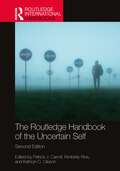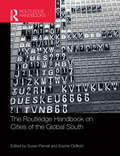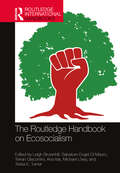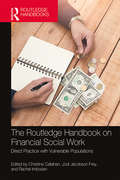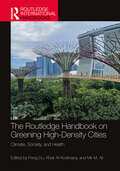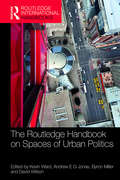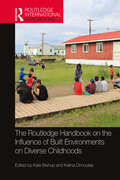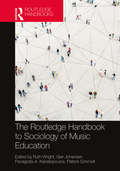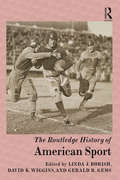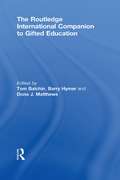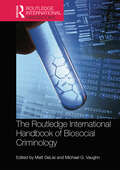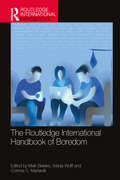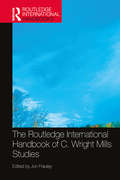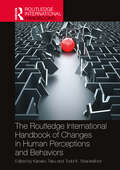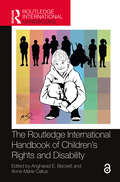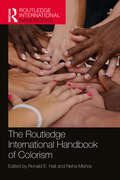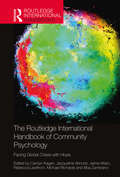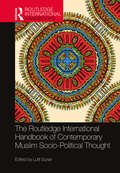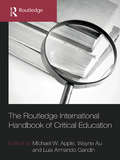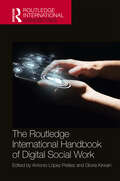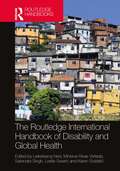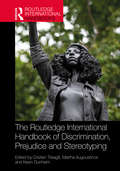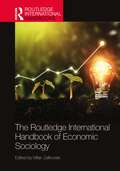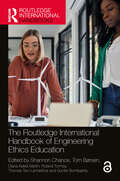- Table View
- List View
The Routledge Handbook of the Uncertain Self (Routledge International Handbooks)
by Patrick J. Carroll Kathryn C. Oleson Kimberly RiosThe second edition of this handbook explores the social, cognitive, motivational, interpersonal, clinical, and applied aspects of personal uncertainty. It showcases both the diversity and the unity that defines contemporary perspectives on uncertainty in self within social and personality psychology.Featuring chapters written by distinguished scholars from a range of disciplines in psychology, this book explores the similarities and differences between personal uncertainty and other psychological experiences in terms of their nature and relationship with human thought, emotion, motivation, and behavior. It takes an interactionist perspective to examine what social and personality psychology knows about the experience of self‑uncertainty in its various forms, exploring its determinants and consequences within and across individuals and groups. The new edition has been extensively revised and updated and includes new material on self‑uncertainty within intimate relationships, in groups, and within spiritual and educational contexts. There is also new content on conspiratorial thinking as well as on the uncertain self within the broader context of uncertainty associated with the COVID‑19 pandemic. Throughout, strategies specifically designed to assist others in confronting the unique challenges posed by self‑uncertainty in ways that emphasize healthy psychological functioning and growth are promoted.Featuring cutting‑edge theory and research on the determinants, experiences, and consequences of uncertainty in the self, the handbook is an invaluable resource for researchers, practitioners, and senior undergraduate and graduate students in social and personality psychology, clinical and counseling psychology, educational psychology, and developmental psychology.
The Routledge Handbook on Cities of the Global South
by Susan Parnell Sophie OldfieldThe renaissance in urban theory draws directly from a fresh focus on the neglected realities of cities beyond the west and embraces the global south as the epicentre of urbanism. This Handbook engages the complex ways in which cities of the global south and the global north are rapidly shifting, the imperative for multiple genealogies of knowledge production, as well as a diversity of empirical entry points to understand contemporary urban dynamics. The Handbook works towards a geographical realignment in urban studies, bringing into conversation a wide array of cities across the global south – the ‘ordinary’, ‘mega’, ‘global’ and ‘peripheral’. With interdisciplinary contributions from a range of leading international experts, it profiles an emergent and geographically diverse body of work. The contributions draw on conflicting and divergent debates to open up discussion on the meaning of the city in, or of, the global south; arguments that are fluid and increasingly contested geographically and conceptually. It reflects on critical urbanism, the macro- and micro-scale forces that shape cities, including ideological, demographic and technological shifts, and constantly changing global and regional economic dynamics. Working with southern reference points, the chapters present themes in urban politics, identity and environment in ways that (re)frame our thinking about cities. The Handbook engages the twenty-first-century city through a ‘southern urban’ lens to stimulate scholarly, professional and activist engagements with the city.
The Routledge Handbook on Ecosocialism (Routledge International Handbooks)
by Michael Löwy Ana Isla Salvatore Engel-Di Mauro Leigh Brownhill Terran Giacomini Terisa E. TurnerBuilding on the classical works that have propelled and shaped ecosocialist thinking and action and more recent political developments on the ground, the volume will provide a reference point for international work in the field, both directly political and academic. The Handbook acquaints readers with the varied roots of and sometimes conflicting approaches to ecosocialism. It does not attempt any unification of ecosocialist currents. Rather, it aims to provide a resource that is as comprehensive as possible with respect not only to theorization and ideological framing, but also and especially to existing projects, practices, and movements and giving a sense of the geographical reach that ecosocialism so far represents. This includes scholarship that extends Marxist foundations and reflects on more recent political developments. The theoretical and practice-oriented moorings are buttressed by discussions on movements, frameworks, and prefigurative processes as well as on social struggles occurring within institutional settings. Together, the collection offers a reference point for international work in the field, in social movements, and in institutional transformations. Providing detailed but accessible overviews of the complex, varied dimensions of ecosocialism, the Handbook is an essential up-to-date guide and reference not only for researchers, but also for undergraduate and graduate students in geography, environmental studies, development studies, sociology, and political science, as well as for policymakers and activists.
The Routledge Handbook on Financial Social Work: Direct Practice with Vulnerable Populations
by Christine Callahan Jodi Jacobson Frey Rachel ImbodenThe Routledge Handbook on Financial Social Work explicates the financial needs, issues, and interventions within populations and theoretical approaches, and it assists clinician practitioners in intervening expertly and comprehensively. This book covers a range of issues in populations seeking services around complex financial needs and struggles, including those in the child welfare system; those with housing issues or facing homelessness; those coping with chronic and acute medical and psychiatric illnesses; those recovering from interpersonal violence; those facing recovery from incarceration; children and families involved in the child welfare system; and much more. In addition, policies will be woven in to inform the work. This book thoroughly explores research and evidence-based interventions around each population, and teaches clinicians to understand and treat financial distress holistically and empathically. This handbook will explain why understanding financial capability in these populations is so critical and how clinicians can step up their practices to meet those needs. Professionals from multiple disciplines ranging from financial therapists to social workers to financial coaches to financial planners will find this handbook eminently useful.
The Routledge Handbook on Greening High-Density Cities: Climate, Society and Health (Routledge International Handbooks)
by Kheir Al-Kodmany Peng Du Mir M. AliThis new handbook provides a platform to bring together multidisciplinary researchers focusing on greening high-density agglomerations from three perspectives: climate change, social implications, and people’s health. Written by leading scholars and experts, the chapters aim to summarize the “state-of-the-art” and produce a reference book for policymakers, practitioners, academics, and researchers to study, design, and build high-density cities by integrating green spaces. The topics covered in the book include (but are not limited to) Urban Heat Island, Green Space and Carbon Sequestration, Green Space and Social Equity, Green Space and Public Health, Biophilic Cities, Urban Agriculture, Vertical Farms, Urban Farming Technologies, Nature and Biodiversity, Nature and Health, Biophilic Design, Green Infrastructure, Urban Revitalization, Post-Covid Cities, Smart and Resilient Cities, Tall Buildings, and Sustainable Vertical Cities.
The Routledge Handbook on Spaces of Urban Politics (Routledge International Handbooks)
by Kevin Ward David Wilson Andrew E. Jonas Byron MillerThe Routledge Handbook on Spaces of Urban Politics provides a comprehensive statement and reference point for urban politics. The scope of this handbook’s coverage and contributions engages with and reflects upon the most important, innovative and recent critical developments to the interdisciplinary field of urban politics, drawing upon a range of examples from within and across the Global North and Global South. This handbook is organized into nine interrelated sections, with an introductory chapter setting out the rationale, aims and structure of the Handbook, and short introductory commentaries at the beginning of each part. It questions the eliding of ‘urban politics’ into the ‘politics of the city’, reconsidering the usefulness of the distinction between ‘old’ and ‘new’ urban politics, considering issues of ‘class’, ‘gender’, ‘race’ and the ways in which they intersect, appear and reappear in matters of urban politics, how best to theorize the roles of capital, the state and other actors, such as social movements, in the production of the city and, finally, issues of doing urban political research. The various chapters explore the issues of urban politics of economic development, environment and nature in the city, governance and planning, the politics of labour as well as living spaces. The concluding sections of the Handbook examine the politics over alternative visions of cities of the future and provide concluding discussions and reflections, particularly on the futures for urban politics in an increasingly ‘global’ and multidisciplinary context. With over forty-five contributions from leading international scholars in the field, this handbook provides critical reviews and appraisals of current conceptual and theoretical approaches and future developments in urban politics. It is a key reference to all researchers and policy-makers with an interest in urban politics.
The Routledge Handbook on the Influence of Built Environments on Diverse Childhoods (Routledge International Handbooks)
by Kate Bishop Katina DimouliasChildren and young people are often discussed as if they are homogenous groups. The reality is, of course, very different, with an enormous variation within each of these groups and in any domain of experience pertaining to childhood or adolescence. Driven by personal, sociocultural, geographic, or economic circumstances, many children and young people worldwide are experiencing a totally different reality to those who fit with more mainstream patterns of childhood. This has substantial implications for their sociophysical environmental experience and our understanding of their physical environmental needs. The aim of this book is to draw attention to these alternate realities for a number of these groups of children and young people, highlighting the unique and different considerations associated with their particular circumstances in each instance, and identifying the repercussions for their physical environmental needs. Ultimately, this book creates an evidence-based discussion which can be used by designers, planners and policy makers, and those delivering services and programs to children and young people as a basis to make informed decisions on how to work with the groups of children and young people in our book for better environmental provision.
The Routledge Handbook to Sociology of Music Education (Routledge Music Handbooks)
by Patrick Schmidt Ruth Wright Geir Johansen Panagiotis A. KanellopoulosThe Routledge Handbook to Sociology of Music Education is a comprehensive, authoritative and state-of-the-art review of current research in the field. The opening introduction orients the reader to the field, highlights recent developments, and draws together concepts and research methods to be covered. The chapters that follow are written by respected, experienced experts on key issues in their area of specialisation. From separate beginnings in the United States, Europe, and the United Kingdom in the mid-twentieth century, the field of the sociology of music education has and continues to experience rapid and global development. It could be argued that this Handbook marks its coming of age. The Handbook is dedicated to the exclusive and explicit application of sociological constructs and theories to issues such as globalisation, immigration, post-colonialism, inter-generational musicking, socialisation, inclusion, exclusion, hegemony, symbolic violence, and popular culture. Contexts range from formal compulsory schooling to non-formal communal environments to informal music making and listening. The Handbook is aimed at graduate students, researchers and professionals, but will also be a useful text for undergraduate students in music, education, and cultural studies.
The Routledge History of American Sport
by Gerald R. Gems Linda J. Borish David K. WigginsThe Routledge History of American Sport provides the first comprehensive overview of historical research in American sport from the early Colonial period to the present day. Considering sport through innovative themes and topics such as the business of sport, material culture and sport, the political uses of sport, and gender and sport, this text offers an interdisciplinary analysis of American leisure. Rather than moving chronologically through American history or considering the historical origins of each sport, these topics are dealt with organically within thematic chapters, emphasizing the influence of sport on American society. The volume is divided into eight thematic sections that include detailed original essays on particular facets of each theme. Focusing on how sport has influenced the history of women, minorities, politics, the media, and culture, these thematic chapters survey the major areas of debate and discussion. The volume offers a comprehensive view of the history of sport in America, pushing the field to consider new themes and approaches as well. Including a roster of contributors renowned in their fields of expertise, this ground-breaking collection is essential reading for all those interested in the history of American sport.
The Routledge International Companion to Gifted Education
by Barry Hymer Tom Balchin Dona J. MatthewsThe Routledge International Companion to Gifted Education is a ground-breaking collection of fully-referenced chapters written by many of the most highly-respected authorities on the subject from around the world. These fifty contributors include distinguished scholars who have produced many of the most significant advances to the field over the past few decades, like Joseph Renzulli and Robert Sternberg, alongside authorities who ask questions about the very concepts and terminology embodied in the field – scholars such as Carol Dweck and Guy Claxton. This multi-faceted volume: highlights strategies to support giftedness in children, providing ideas that work and weeding out those that don’t; is written in jargon-free language in an easy-to use themed format; is the most authoritative collection of future-focused views, ideas and reflections, practices and evaluations yet produced; includes chapters dealing with the major controversies and concerns in the field today, from the problems of identification to changing understandings of giftedness and creativity. The international aspect of the Companion, and its juxtaposition of points of view – whereby chapters are deliberately positioned and accompanied by editorial commentary to highlight the contrasts with each other – ensures that different views are addressed, allowing the reader to absorb and reflect upon the many perspectives on each issue. The Companion is a guide to the new ideas and controversies that are informing gifted education discussion and policy-making around the world. It is a first class resource to students and researchers alike.
The Routledge International Handbook of Biosocial Criminology (Routledge International Handbooks)
by Matt DeLisi; Michael G. VaughnBiosocial criminology is an interdisciplinary field that aims to explain crime and antisocial behavior by exploring both biological factors and environmental factors. Since the mapping of the human genome, scientists have been able to study the biosocial causes of human behaviour with the greatest specificity. After decades of almost exclusive sociological focus, criminology has undergone a paradigm shift where the field is more interdisciplinary and this book combines perspectives from criminology and sociology with contributions from fields such as genetics, neuropsychology, and evolutionary psychology. The Routledge International Handbook of Biosocial Criminology is the largest and most comprehensive work of its kind, and is organized into five sections that collectively span the terrain of biosocial research on antisocial behavior. Bringing together leading experts from around the world, this book considers the criminological, genetic and neuropsychological foundations of offending, as well as the legal and criminal justice applications of biosocial criminological theory. The handbook is essential reading for students, researchers, and practitioners from across the social, behavioural, and natural sciences who are engaged in the study of antisocial behaviour.
The Routledge International Handbook of Boredom (Routledge International Handbooks)
by Maik Bieleke Wanja Wolff Corinna S. MartarelliThis comprehensive text is a unique handbook dedicated to research on boredom. The book brings together leading contributors from across three continents and numerous fields to provide an interdisciplinary exploration of boredom, its theoretical underpinnings, its experiential properties, and the applied contexts in which it occurs.Boredom is often viewed as a mental state with little utility, though recent research suggests that it can be a powerful motivator of human behavior that shapes our actions in many ways. The book examines boredom from a range of perspectives and is comprised of three parts. Part I delves into the theoretical approaches to boredom, presenting methods for its measurement, explaining when and why boredom occurs, and scrutinizing the impact it has on our behavior. Part II focuses on the psychological and neural properties of boredom and its associations with a multitude of mental and interpersonal processes, such as self-control, mind-wandering, flow, and aggression. Part III presents boredom in practical contexts like school and work, and sheds light on its role for health-related behaviors, psychosocial well-being, and aesthetic experiences. The book concludes by summarizing the state of boredom research, identifying promising areas for future research, and providing directions for how research on boredom can be advanced. As the authoritative book on boredom, this handbook is an essential resource for students and researchers of psychology, sociology, education, sport science, and computer science.
The Routledge International Handbook of C. Wright Mills Studies (Routledge International Handbooks)
by Jon FrauleyThe Routledge International Handbook of C. Wright Mills Studies brings together leading scholars of the work of radical sociologist C. Wright Mills to showcase its impact across the social sciences. Showing how Mills’ thought can be taken up - and in some cases, sympathetically reformulated - to tackle problems of power and politics, it presents an authoritative state-of-the-art overview of Mills’ groundbreaking ideas and his far-reaching theoretical and methodological impact. Crucially, the volume also illustrates the value of thinking with Mills in addressing the complexities of contemporary capitalist democracies. As such, it will appeal to scholars of sociology, anthropology, organization studies, peace and conflict studies, criminology, politics and public administration.
The Routledge International Handbook of Changes in Human Perceptions and Behaviors (Routledge International Handbooks)
by Todd K. Shackelford Kanako TakuThe Routledge International Handbook of Changes in Human Perceptions and Behaviors is the first edited volume to present multidisciplinary perspectives on various aspects of changes that humans experience.The handbook is designed to highlight the different contents, types, ways, meanings, applications, and moments of changes that have been recognized by experts in various fields within the life and social sciences. Comprised of four sections, the chapters address changes in a variety of contexts related to human perceptions and behaviors; the moment of change and fluctuations; changes in applied settings; and the meaning of changes, including resistance to change. Written by a range of expert international contributors, the book brings together discussions and insights about how different levels and types of changes in human perceptions, attitudes, beliefs, values, and behaviors have been studied and considered in diverse fields. It also explores the various mechanisms that account for changes, exploring how and when changes occur and what changes mean to humans.Relevant for empirical and theoretical work, the handbook will be of great interest to researchers, academics, and postgraduate students across psychology, behavioral sciences, and social sciences.
The Routledge International Handbook of Children's Rights and Disability (Routledge International Handbooks)
by Angharad E. Beckett Anne-Marie CallusThis handbook provides authoritative and cutting-edge analyses of various aspects of the rights and lives of disabled children around the world. Taking the UN Convention on the Rights of Persons with Disabilities (CRPD) and the UN Convention of the Rights of the Child (CRC) as conceptual frameworks, this work appraises the current state of affairs concerning the rights of disabled children across different stages of childhood, different life domains, and different socio-cultural contexts. The book is divided into four sections: Legislation and Policy Children’s Voice The Life Course in Childhood Life Domains in Childhood Comprised of 37 newly commissioned chapters featuring analyses of UN documents and case studies from Australia, Brazil, Ethiopia, Hong Kong, Italy, the Netherlands, Norway, Papua New Guinea, Serbia, South Africa, Spain, Sweden, the United Kingdom, the United States, and Vanuatu, its multidisciplinary approach reflects the complexities of the lives of disabled children and the multifarious nature of the strategies needed to ensure their rights are upheld. It will be of interest to researchers and students working in disability studies, education, allied health, law, philosophy, play studies, social policy, and the sociology of childhood. It will also be a valuable resource for professionals/practitioners, allowing them to consider future directions for ensuring that disabled children’s rights are realised and their well-being and dignity are assured.
The Routledge International Handbook of Colorism (Routledge International Handbooks)
by Ronald E. Hall Neha MishraThis timely and unique edited book explores the concept of colorism, which is discrimination based on the color of a person’s skin. It takes a global approach that draws on authentic voices from varied contexts and is dedicated to exploring and enriching the diverse intellectual discourse on colorism.The book explores colorism across the globe and studies how it has been woven into the cultural fabric of communities of color. With 22 chapters organised geographically into parts representing six continents, it looks at various facets of colorism, offering international insights beyond a Western perspective. The handbook examines policy-making in the sphere of colorism internationally and across countries, and provides thoughtful insights on colorism discrimination in different contexts. Chapters are written by leading experts from different disciplinary backgrounds who present cutting-edge research on the topic of colorism in different country contexts, contributing to a global dialogue on colorism.The Routledge International Handbook of Colorism comprehensively highlights colorism and skin color bias which blurs the national and international boundaries. It will be fascinating reading for students and academics in psychology, social work, education, criminal justice and other social sciences. It will also be of interest to those working in areas relating to marginalization, human rights, diversity and inclusion.
The Routledge International Handbook of Community Psychology: Facing Global Crises with Hope (Routledge International Handbooks)
by Carolyn KaganThis handbook offers a unique critical and cross-disciplinary approach to the study of Community Psychology, showing how it can address the systemic challenges arising from multiple crises facing people across the world. Addressing some of the most pressing issues of our times, the text shows how Community Psychology can contribute to principled social change, giving voice, enabling civic participation and supporting the realignment of social and economic power within planetary boundaries. Featuring a collaboration of contributions from world-leading academics, early career researchers and community leaders, each chapter gives theory and context with practical examples of working with those living in precarious situations, on matters that concern them most, and highlights positive ways to contribute to progressive change. The editors examine economic, ecological, demographic, gender, violence, energy, social and cultural, and political crises in relation to psychological theories, as well as public policy and lived experiences, presenting an approach situated at the intersection of public policy and lived experiences. Viewed through four different perspectives or lenses: a critical lens; a praxis lens; an ecological lens and a reflective lens, this compendium of critical explorations into Community Psychology shows how it can contribute to a fairer, more just, resilient and sustainable world. Also examining the lessons learnt from the COVID-19 pandemic about the pervading nature of social inequality, but also the potential of solidarity movements ranging from local to international levels, this is ideal reading for undergraduate and postgraduate students and scholars in Community Psychology and related areas, including social psychology, clinical psychology and applied psychology.
The Routledge International Handbook of Contemporary Muslim Socio-Political Thought (Routledge International Handbooks)
by Lutfi SunarThis volume unfolds the ebbs and flows of Muslim thought in different regions of the world, as well as the struggles between the different intellectual discourses that have surfaced against this backdrop. With a focus on Turkey, Egypt, Iran and the Indian subcontinent – regions that, in spite of their particular histories and forms of thought, are uniquely placed as a mosaic that illustrates the intertwined nature of the development of Muslim socio-political thought – it sheds light on the swing between right and left in different regions, the debates surrounding nationalism, the influence of socialism and liberalism, the rise of Islamism and the conflict between state bureaucracy and social movements. Exploring themes of civil society and democracy, it also considers current trends in Muslim thought and possible future directions. As such, it will appeal to scholars across the fields of sociology, anthropology, political science, history and political economy, as well as those with interests in the study of religion, the development of Muslim thought, and the transformation of Muslim societies in recent decades.
The Routledge International Handbook of Critical Education (Routledge International Handbooks of Education)
by Michael W. Apple Wayne Au Luis Armando GandinThe Routledge International Handbook of Critical Education is the first authoritative reference work to provide an international analysis of the relationship between power, knowledge, education, and schooling. Rather than focusing solely on questions of how we teach efficiently and effectively, contributors to this volume push further to also think critically about education's relationship to economic, political, and cultural power. The various sections of this book integrate into their analyses the conceptual, political, pedagogic, and practical histories, tensions, and resources that have established critical education as one of the most vital and growing movements within the field of education, including topics such as: social movements and pedagogic work critical research methods for critical education the politics of practice and the recreation of theory the freirian legacy. With a comprehensive introduction by Michael W. Apple, Wayne Au, and Luis Armando Gandin, along with thirty-five newly-commissioned pieces by some of the most prestigious education scholars in the world, this Handbook provides the definitive statement on the state of critical education and on its possibilities for the future.
The Routledge International Handbook of Deindustrialization Studies (Routledge International Handbooks)
by Stefan Berger Steven High Tim Strangleman Jackie Clarke Sherry Lee LinkonThe Routledge International Handbook of Deindustrialization Studies is a timely volume that provides an overview of this interdisciplinary field that emerged in response to the widespread decline of manufacturing and heavy industry from the 1980s onward. Edited by prominent figures in the field, the volume brings together many of the leading scholars from a range of countries across the globe to offer a multifaceted overview of deindustrialization and its impact. Deindustrialization has been cited as one of the factors behind the rise of the far right, and to a lesser extent the far left, across Europe, the rise and success of Trumpism in the US, and the Brexit vote as well as the more recent and sudden erosion of UK Labour’s ‘Red Wall’ of the North of England. This collection brings together scholars of deindustrialization around the globe and from a wide variety of academic disciplines including history, sociology, politics, geography, economics, anthropology, literature, arts practice, photography, heritage, and cultural studies. In doing so, the volume explores the roots of deindustrialization across the world, highlights the key themes and issues in the field, illustrates the intersectional and interdisciplinary character of the field, and shows how deindustrialization lies at the heart of many of the key political, cultural, social, and economic issues of our time.Written in a clear and accessible style, the Handbook is a comprehensive interdisciplinary volume for this young but maturing field. The volume is a valuable resource for students, teachers, and researchers interested in industrial decline, closure, and the multifaceted impacts they cause. It speaks to readers across the arts, humanities, and social and political sciences concerned with deindustrialization broadly defined.Chapter 27 of this book is freely available as a downloadable Open Access PDF at http://www.taylorfrancis.com under a Creative Commons [Attribution-Non Commercial-No Derivatives (CC-BY-NC-ND)] 4.0 International license.
The Routledge International Handbook of Digital Social Work (Routledge International Handbooks)
by Antonio López Peláez Gloria KirwanThis handbook provides an authoritative and cutting-edge overview of current research and trends related to the emerging field of digital technology and social work. This book is divided into six sections: Part 1 Reframing Social Work in a Digital SocietyPart 2 Shaping a Science of Social Work in the Digital SocietyPart 3 Digital Social Work in PracticePart 4 The Ethics of Digital Social WorkPart 5 Digital Social Work and the Digitalization of Welfare Institutions: Opportunities, Challenges and Country CasesPart 6 Digital Social Work: Future Challenges, Directions and Transformations This book, comprised of 40 specially commissioned chapters, explores the main intersections between social work theory and practice in an increasingly digitized world. Bringing a critical focus to how social work as a profession is adapting exponentially to embrace the benefits of technology, it gives specific consideration to the digitalization of the social work profession, including the ways in which social workers are using different forms of technology to provide effective services and innovative practice responses. With chapters on big data, digital archiving, e-citizenship and inclusion, gerontechnology, children and technology, and data ethics, this book will be of interest to all social work scholars, students and professionals as well as those working in science and technology studies more broadly.
The Routledge International Handbook of Disability and Global Health (Routledge International Handbooks)
by Leslie Swartz Karen Soldatić Lieketseng Ned Minerva Rivas Velarde Satendra SinghThis handbook will raise awareness about the importance of health and well-being of people with disabilities in the context of the global development agenda: Leaving No-one Behind.There has been a growing discussion on how people with disabilities should be included in the global health landscape. An estimated one billion people have some form of disability, 80% of whom live in low- and middle-income settings. People with disabilities are more likely to be poor, with restricted access to health and social services, education, rehabilitation and employment. Despite this, people with disabilities are often overlooked in global health and development efforts. Furthermore, the COVID-19 pandemic has shown that unless systematically planned for and included in policies and programmes, people with disabilities remain at an increased risk of being adversely affected in times of humanitarian crisis and emergency disasters.Divided into eight sections: Disability and Health Frameworks Health Justice, Rights and Bioethics Gendering Disability Health Disability and Global Mental Health Disability and Access to Healthcare, Including Workforce Development Crises and Health Technology and Digital Health Disability, Ageing and Dementia Care This handbook covers the full range of topics pertaining to disability and global health including inclusive health; access to rehabilitation; global mental health and disability; medical training and disability; community based inclusive development for improving health and rehabilitation; maternal health and sexual reproduction; preventive care and health promotion for people with disabilities; health, disability and indigenous knowledges; bioethics and human rights; data protection; and health in the global south.It will be of interest to all scholars, students and professionals working in the fields of disability studies, health studies, nursing, medicine, allied health, development studies and sociology.
The Routledge International Handbook of Discrimination, Prejudice and Stereotyping (Routledge International Handbooks)
by Cristian Tileagă Martha Augoustinos Kevin DurrheimThis handbook explores prejudice, stereotyping and discrimination primarily as phenomena embedded in the social organization of societies and connected to structural factors and larger societal systems. It offers a unique critical and cross-disciplinary approach to the study of contemporary manifestations of prejudice, stereotyping and discrimination. New socio-psychological analyses of the most pressing social problems of our age bring into view future directions of research on prejudice, stereotyping and discrimination oriented to social change and collective action and that engage with wider systems of norms and discourse. The editors draw on social psychology, sociology, social policy, clinical psychology, cultural studies and feminist, antiracist and decolonizing social science to show how social psychology can successfully rekindle its intellectual dialogue with kindred social science fields to create broader foundations for the exploration of the paradoxes lodged at the heart of the social expression of prejudice in liberal democracies. This is essential reading for anyone interested in prejudice, discrimination and stereotypes. The handbook will be of interest to academics and researchers exploring both the quantitative and qualitative aspects of discrimination, inequality and social exclusion, as well as students undertaking masters or doctoral studies in social psychology, political psychology and political science.
The Routledge International Handbook of Economic Sociology (Routledge International Handbooks)
by Milan ZafirovskiThis handbook presents a systematic and comprehensive overview of economic sociology, an exemplary interdisciplinary field which draws on theoretical frameworks and empirical findings from both economics and sociology to present a unique lens on the interdependence of the economy and society. The handbook is arranged in four parts which together present the current state-of-the-art of economic sociology as well as pointing toward future directions for research. The first part outlines the theoretical foundations of economic sociology and its relations to other fields, particularly with regard to other alternative approaches to economics, and looks at conceptions and definitions of economic sociology vary. The second part provides an overview of the historical development of economic sociology from classical political economy to the present day. The third part explores the main problematics of economic sociology, analyzing the economy in relation to particular social institutions, the state, ideology, culture and art, religion, gender, race/ethnicity, and more. The fourth part focuses on the principal branches including sociology of the market, industrial organization and work, uncertainty, distribution and inequality, money and finance, and the environment. The stellar international cast of contributors is drawn from both economics and sociology, therefore presenting a holistic view of the field and contributing to a rejuvenation of economic sociology within economics. It is an indispensable reference work for researchers and students across a broad range of sociological and economic disciplines.
The Routledge International Handbook of Engineering Ethics Education (Routledge International Handbooks of Education)
by Shannon Chance and Tom BørsenResponding to the need for a timely and authoritative volume dedicated to this burgeoning and expansive area of research, this handbook will provide readers with a map of themes, topics, and arguments in the field of engineering ethics education (EEE).Featuring critical discussion, research collaboration, and a team of international contributors of globally recognized standing, this volume comprises six key sections which elaborate on the foundations of EEE, teaching methods, accreditation and assessment, and interdisciplinary contributions. Over 100 researchers of EEE from around the globe consider the field from the perspectives of teaching, research, philosophy, and administration. The chapters cover fast-moving topics central to our current understanding of the world such as the general data protection regulation (GDPR), artificial intelligence (AI), biotechnology, and ChatGPT; and they offer new insights into best practices research to equip program leaders and instructors delivering ethics content to students.This Open Access volume will be of interest to researchers, scholars, postgraduate students, and faculty involved with engineering education, engineering ethics, and philosophy of education. Curriculum designers, staff developers teaching pedagogical courses to faculty, and engineering professionals may also benefit from this volume.The Open Access version of this book, available at http://www.taylorfrancis.com, has been made available under a Creative Commons Attribution-Non Commercial-No Derivatives (CC-BY-NC-ND) 4.0 license.
